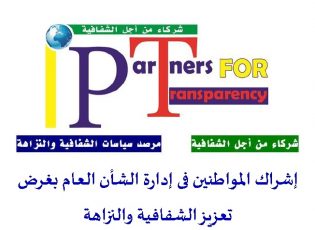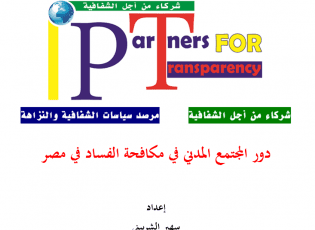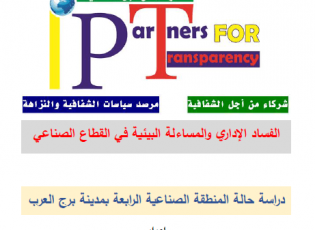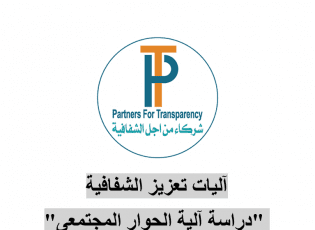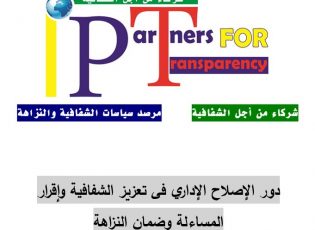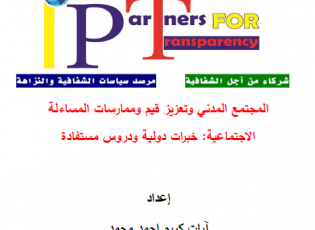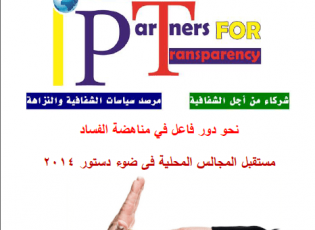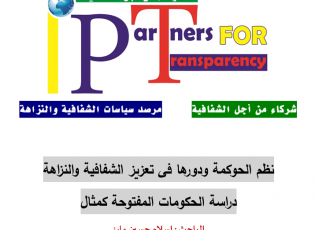"Our Voices Against Your Money" initiative
Back paper
Smoothing
Partners for Transparency PFT A non-governmental organization, declared in accordance with the provisions of Egyptian law under the number “9729” in December 2014, that takes into account independence and neutrality “politically” and “ideologically”, and works within the framework of helping society to consolidate and implement the values and practices of integrity, transparency, and accountability, in order to achieve development. “Comprehensive and respect for human rights, and construction of a good governance system.
In the context of its keenness on the integrity of the upcoming parliamentary elections, it will partner for transparency. PFT Implementing an initiative that is the first of its kind in Egypt to monitor electoral financing and spending in a number of electoral districts, under the title “ Our voices are facing your money Pursuant to the principle of transparency that you are committed to. Partners for Transparency PFT It presents this paper to those interested and concerned with the electoral issue, in order to define its initiative and the legal and methodological foundations on which it is based before the actual implementation. .
Why monitor electoral spending?
The issue of “electoral financing and spending” is one of the main issues that determine - along with other issues - the extent of the integrity of the electoral process, the extent to which its final results express the true will of the electorate, and the extent to which “money” was a factor affecting the course of the political process (the use of Political money).
In Egypt, interest in the issue of “political money” and its use is increasing with the approaching parliamentary elections, which are the first after the revolutionary wave on June 30, 2013, and the second after the January 2011 revolution. There are several objective justifications for increasing interest in this issue, which can be highlighted as follows: -
- There is objective evidence of a significant and positive decline in the traditional forms of violations associated with the electoral process. The material fraud that prevailed before January 25, 2011, and the manipulation of the results of counting ballot papers are all manifestations that are no longer common in the elections and referendums after January 2011, in addition to the existing legislation. The procedures governing the electoral process do not allow the reproduction of these appearances on a scale that leads to the safety and integrity of the electoral process. However, other forms of violations still fear their negative impact on the elections, and perhaps the most prominent of these possible violations will be those related to the use of political money directly (Introduction Financial or in-kind bribes), or indirectly (exceeding the legal spending limit - relying on illegal sources to finance the election campaign).
- Although the legal framework regulating the electoral process is insufficient to control electoral financing and spending and does not guarantee the existence of effective mechanisms to monitor it, it does include new texts that can be built upon, and therefore the interest in this issue appears consistent with the legislative orientation itself, in addition to that this interest can be reflected in The future will develop this legislation.
- The experiences and initiatives of Egyptian civil society organizations in the field of monitoring electoral spending are very limited, which has led to a severe lack of expertise that can be built upon, and an almost complete absence of tools that can be used to monitor the electoral spending of candidates and parties, and therefore we are facing the need to start establishing these tools with In the future, Egyptian civil society organizations can expand the scope of their follow-up on electoral financial spending.
The legislative framework regulating financial spending on elections
Financial spending according to international instruments
Control of electoral spending derives its logic from international standards concerned with protecting the right to political participation. Article 25 of the International Covenant on Civil and Political Rights stipulates the right of citizens without discrimination to vote, hold public offices and manage public affairs by themselves or through their representatives.
According to the interpretation of the Human Rights Committee on the Application of the International Covenant on Civil and Political Rights, in its Commentary on Article 25 of the Covenant, reasonable limits on campaign spending can be justified, to ensure that the freedom of voter choice is not undermined or the democratic process distorted through excessive spending in favor of any candidate or Party.
The United Nations Convention against Corruption also stipulates that “each state party shall consider taking appropriate legislative and administrative measures, consistent with the objectives of the convention and in accordance with the basic principles of its domestic law, to enhance transparency in the financing of candidacies for the election of public office holders and in the financing of political parties.”
Financial spending in the Law on Exercising Political Rights
The Exercise of Political Rights Law No. 45 of 2015 came to lay down regulatory procedures for electoral financing and spending, and we can define the most important of these procedures as follows:
- The law grants the right to every candidate to receive cash or in-kind donations from Egyptian natural persons and Egyptian parties only, but stipulates that the amount of this donation does not exceed 5% (five percent) of the maximum determined spending in the election campaign.
- It is prohibited for the candidate to receive the elections (individual or list) from obtaining any contributions or cash or in-kind support for the electoral campaign from any legal person, whether Egyptian or foreign, or from any country, foreign body, international organization, or any entity whose capital is an Egyptian person. Or a natural or legal foreigner, or any foreign entity of whatever form, and it is also prohibited to receive donations from a natural foreign person.
- The law obligates each candidate to open an account in local currency in a bank specified by the Supreme Elections Committee or at one of the post offices, and the period stipulates that this be among the nomination papers, and what he receives from cash donations and what he allocates from his money for advertising and is credited to it The monetary value of in-kind donations, and it is required that both the bank and the candidate inform the committee first-hand of what is deposited in this account and its source, and the candidate is also obligated to notify the committee of his expenditures from this account, during the dates and in accordance with the procedures it determines, and the law stipulates that spending on The election campaign is outside this account.
- Each candidate was obligated to keep a regular record in accordance with the accounting standards in which he recorded the sources of funding and the expenses of his electoral campaign, and entrusted the Supreme Committee with the controls and procedures for keeping these books and submitting this record for review.
- The law stipulates that the Supreme Committee shall form monitoring committees composed of independent experts, to be entrusted with monitoring the incidents that take place at the governorate level, in violation of the controls established by the constitution, the law, or the decisions of the Supreme Committee regarding advertising.
- The law placed some prohibitions in the preaching that the candidate would make, including those related to spending, including the use of buildings, facilities and means of transport owned by the state or by public sector companies and the public business sector. And the headquarters of associations and civil institutions, as well as the use of public facilities, places of worship, universities, schools, university cities and other public and private educational institutions. And the prohibition of spending public funds or funds of public sector companies, the public business sector, associations and civil institutions, and also prohibiting the giving of gifts, donations or cash assistance or In kind or other benefits, or a promise to provide them, whether directly or indirectly.
- The law specified the start of the electoral campaigning from the date of announcing the final list of candidates until the twelfth hour of the day preceding the date set for polling, and in the case of the run-off election, it would start from the day following the announcement of the polling result in the first round until twelve o'clock noon the day preceding the date set for polling in the elections. Replays. Election advertising outside of these dates was prohibited by any means.
- The law stipulates the penalty for a fine of not less than ten thousand pounds and not more than one hundred thousand pounds in the case of carrying out any act of advertising in violation of the time specified by the law, or spending on electoral advertising unrestricted amounts in the bank account set by the Supreme Committee, accepting a donation in excess of The stipulated percentage (with confiscation of funds that represent an increase in this percentage)
- The law stipulates a prison sentence and a fine of not less than one hundred thousand pounds and not exceeding one million pounds, if he obtains any of the prohibited donations, and the court shall order the confiscation of the funds subject of the crime. .
The general framework of the “Our Voices vs Your Money” initiative
The overall goal of the initiative
Seeking " Partners for Transparency PFT Through the initiative ” Our voices are facing your money ”, To contribute to achieving the integrity of the upcoming House of Representatives elections by opposing the phenomenon of using money to influence the will of the voters, in addition to developing effective“ approaches ”and tools that can be used extensively later to enhance the role of civil society organizations in monitoring“ electoral financing and spending ”, and ensuring the commitment of Candidates and parties with governing legal frameworks.
Geographical scope
The initiative will be implemented. Our voices are facing your money“In five electoral districts in one district in each of the governorates (Cairo - Fayoum - Dakahlia - Port Said - Alexandria), and these districts are: -
|
Governorate |
Constituency |
The number of seats allocated |
|
Cairo |
The Nineteenth Constituency (Maadi and Tora) | 1 |
|
Fayoum |
The Second District (Fayoum City) |
2 |
|
Dakahlia |
The First District (Mansoura City) |
3 |
|
Port Said |
The First Circle (East Circle) |
1 |
| Alexandria | The Fourth District (Muharram Bek) |
2 |
Districts were chosen to give a good indication of the nature of financial spending throughout the electoral process, as well as to facilitate the process of disseminating results, recommendations and tools that the initiative will come out with.
The methodology used in the follow-up process
Will be applied ” Partners for Transparency PFT An integrated approach in the follow-up process is based on the combination of collecting documented field information related to each of the candidates competing for the seat (s) of the constituency, and analyzing this information based on the regulatory legal framework, in preparation for the issuance of a progress report and a final report that includes a closer estimate of the features of electoral financing and spending for each candidate. The final report will also present a set of recommendations and tools for a proposal that can be used extensively later to monitor financial spending. These recommendations and tools are mainly directed to the concerned parties (civil society organizations - election management bodies - media).
The methodology also depends on the integration of a group of community parties in the follow-up process, and these parties are: financial analysts and accountants, advertising specialists, monitors and information collectors, as a committee will be formed from these within each electoral district, and the committee will apply the main tool represented in the “Funding Analysis Form And candidate's electoral spending
The “Candidate’s Electoral Expenditure and Funding Analysis Form” will be designed in a way that allows taking a set of social, political and legal factors into consideration when estimating the funding and spending of each candidate. It also allows a link between the information package collected in the field and that information that will be accessed through communication with the candidates themselves And their campaign managers, and in general the most important information included is as follows: -
- The extent of the commitment to open a special account for the campaign and keep books.
- The availability of the necessary human elements to manage the financing and spending process.
- The legal extent of the campaign financing sources and commitment to the approved percentage of donations.
- The extent of commitment to the maximum electoral spending.
- The extent of the commitment not to pay bribes of any kind or the promise to pay them.
- The extent of the commitment not to use public facilities or public funds (including NGO funds) in advertising activities.
The executive and procedural steps of the initiative
An initiative will be launched "Our Voices Against Your Money" In mid-September 2015, as it will begin training and qualifying members of the committees formed in the constituencies, the committees for evaluating electoral financing and expenditures, and the field monitoring teams and collecting information. The initiative will adhere to a specific timeframe in the follow-up process, which is the electoral campaign period before the first polling round, as well as before Run-off.


